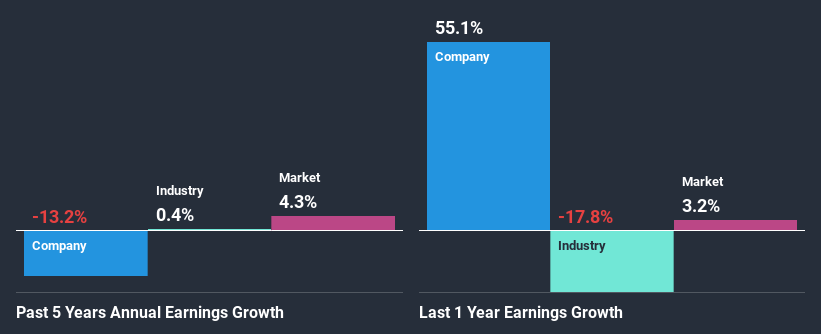- South Korea
- /
- Basic Materials
- /
- KOSDAQ:A198440
Is The Market Rewarding KOREA CEMENT co., Ltd (KOSDAQ:198440) With A Negative Sentiment As A Result Of Its Mixed Fundamentals?
With its stock down 8.2% over the past month, it is easy to disregard KOREA CEMENT (KOSDAQ:198440). It seems that the market might have completely ignored the positive aspects of the company's fundamentals and decided to weigh-in more on the negative aspects. Stock prices are usually driven by a company’s financial performance over the long term, and therefore we decided to pay more attention to the company's financial performance. In this article, we decided to focus on KOREA CEMENT's ROE.
Return on Equity or ROE is a test of how effectively a company is growing its value and managing investors’ money. In simpler terms, it measures the profitability of a company in relation to shareholder's equity.
View our latest analysis for KOREA CEMENT
How Do You Calculate Return On Equity?
Return on equity can be calculated by using the formula:
Return on Equity = Net Profit (from continuing operations) ÷ Shareholders' Equity
So, based on the above formula, the ROE for KOREA CEMENT is:
3.1% = ₩2.8b ÷ ₩90b (Based on the trailing twelve months to September 2020).
The 'return' is the income the business earned over the last year. So, this means that for every ₩1 of its shareholder's investments, the company generates a profit of ₩0.03.
What Is The Relationship Between ROE And Earnings Growth?
We have already established that ROE serves as an efficient profit-generating gauge for a company's future earnings. We now need to evaluate how much profit the company reinvests or "retains" for future growth which then gives us an idea about the growth potential of the company. Assuming all else is equal, companies that have both a higher return on equity and higher profit retention are usually the ones that have a higher growth rate when compared to companies that don't have the same features.
A Side By Side comparison of KOREA CEMENT's Earnings Growth And 3.1% ROE
As you can see, KOREA CEMENT's ROE looks pretty weak. A comparison with the industry shows that the company's ROE is pretty similar to the average industry ROE of 3.1%. Given the circumstances, the significant decline in net income by 13% seen by KOREA CEMENT over the last five years is not surprising.
That being said, we compared KOREA CEMENT's performance with the industry and were concerned when we found that while the company has shrunk its earnings, the industry has grown its earnings at a rate of 0.4% in the same period.

The basis for attaching value to a company is, to a great extent, tied to its earnings growth. It’s important for an investor to know whether the market has priced in the company's expected earnings growth (or decline). Doing so will help them establish if the stock's future looks promising or ominous. Is KOREA CEMENT fairly valued compared to other companies? These 3 valuation measures might help you decide.
Is KOREA CEMENT Making Efficient Use Of Its Profits?
Conclusion
Overall, we have mixed feelings about KOREA CEMENT. While the company does have a high rate of profit retention, its low rate of return is probably hampering its earnings growth. Wrapping up, we would proceed with caution with this company and one way of doing that would be to look at the risk profile of the business. You can see the 3 risks we have identified for KOREA CEMENT by visiting our risks dashboard for free on our platform here.
If you’re looking to trade KOREA CEMENT, open an account with the lowest-cost* platform trusted by professionals, Interactive Brokers. Their clients from over 200 countries and territories trade stocks, options, futures, forex, bonds and funds worldwide from a single integrated account. Promoted
Valuation is complex, but we're here to simplify it.
Discover if Kangdong C&L might be undervalued or overvalued with our detailed analysis, featuring fair value estimates, potential risks, dividends, insider trades, and its financial condition.
Access Free AnalysisThis article by Simply Wall St is general in nature. It does not constitute a recommendation to buy or sell any stock, and does not take account of your objectives, or your financial situation. We aim to bring you long-term focused analysis driven by fundamental data. Note that our analysis may not factor in the latest price-sensitive company announcements or qualitative material. Simply Wall St has no position in any stocks mentioned.
*Interactive Brokers Rated Lowest Cost Broker by StockBrokers.com Annual Online Review 2020
Have feedback on this article? Concerned about the content? Get in touch with us directly. Alternatively, email editorial-team (at) simplywallst.com.
About KOSDAQ:A198440
Imperfect balance sheet with very low risk.
Market Insights
Community Narratives



